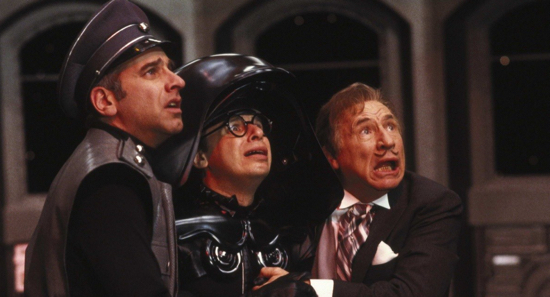Emily S. Whitten: Seven Movies for Surviving Snowzilla
This past weekend we here in Washington DC got a lot of snow. Um… “A whole lot of snow”? …Okay, how about, “a metric ton of snow”? Ooh… “The fourth heaviest snowstorm dating to 1884.” There. I think that sums it up nicely.
Given this, I (not even kidding) have not left my home in five days (but I’m still sane! No really, I promise! The purple bunnies in my pantry told me so.) And of course, being a very practical person, since I knew the storm was coming I ensured I was well-stocked with all the necessary items beforehand. But then, around the end of Day 1, as the snowdrifts began inching into the two-foot range on my windowsills, I began to wonder what I would do to entertain myself if the power went out (taking with it, one might assume, the Internet).
“Ah-ha!” I said to myself. “I have a fully charged computer with a DVD player, and a backup battery. So even if the power goes out, and Netflix goes out, I could still watch movies if I wanted to” (aren’t modern times great?). But of course, I would be limited to the movies I owned on good old-fashioned DVDs. “So,” I said, turning to my trusty DVD collection, “what have we here…?” And there I found, in my very healthy collection of DVDs (what, I still like owning stuff) seven sci-fi and fantasy movies that I would happily watch during a snowstorm. And given that we might have another crazy snowstorm sometime, I think you should own them too. (Nota bene: I am not looking at series films because my battery would probably die before the end; and I’m not looking at comic book films, because most of them are series films as well as stand-alones, so see point 1.) So here they are:
Look, Star Wars is awesome. I love Star Wars. But it’s Day 1, and the snow has just started falling, and you don’t want to be tied down to a trilogy. You want a nice glass of wine, a good laugh, and that warm glow of feeling you’re inside watching a silly parody while the first flakes fall, instead of outside on your way home from work in the cold. Spaceballs is just the thing. Funny enough to stand on its own (I know, since I saw Spaceballs before I ever saw Star Wars, thanks to Channel 11 back in the day), it’s got a set of great comedic actors, including Bill Pullman (who can also pull off a serious leader-slash-action hero, à la Independence Day), John Candy, and Rick Moranis. And although I don’t know Daphne Zuniga from a lot of other comedic acting, she does a bang-up job as Princess Leia’s more ridiculous doppelgänger. And, of course, there’s Mel Brooks. You gotta love Mel Brooks, the king of comedic parody and wordplay, who is not above turning an instruction like “comb the desert” into a multi-layered gag . (And shout-out to Rob Paulsen, voicing one of the Spaceballs there.) Man, I love this movie.
Okay, okay, you’ve had a few laughs, and the snow is falling in earnest now, and it’s time to Get Serious. Enter Tom Cruise as noble but wavering action hero John Anderton, in the high-tech world of Pre-Crime. This Philip K. Dick-based movie boasts a creepy set of scientifically-explained psychic mutants predicting the future, computer displays that are second only to those in Iron Man for how jealous they make me, and a car chase scene that is one of the more unique I’ve seen. Add into that a fairly well-constructed plot with some great reveals, focusing on multiple possible future time-paths and the interplay of choice, perception, and pre-determined outcomes, and this is a great watch to keep you occupied instead of staring out the window suddenly wondering if you remembered to buy toilet paper. Plus, it’s got Colin Farrell doing an impressive job as earnest government investigator Danny Witwer. Seriously, he’s really underrated in this.
Well, the snow’s been coming down for some time, and maybe you need a little magic. And a little eye-candy, of both the human and wondrous sort. (And a little Bowie, may he rest in peace.) Snuggle up with The Prestige, a beautifully-done film based on the novel of the same name by Christopher Priest, which takes magic to a whole new level by pitting a pair of rising magician friends-turned-bitter enemies against each other, as each desperately tries to outdo the other in becoming their century’s greatest magician. But there’s more to this movie than meets the eye, as anyone who’s watched a Christopher Nolan film should know. Alongside the lush visuals of a Victorian era gone by and a gorgeous, talented cast (Christian Bale, Hugh Jackman, Scarlett Johansson, Piper Perabo, David Bowie…need I go on?), we’ve got intrigue, and plot twists, and science-made-magical (Tesla!) galore. This movie is mesmerizing, and intense, and if you’re trying to stave off the boredom of being several hours into the storm, you couldn’t ask for a better film to surprise you and keep you thinking after the last credits roll.
Okay! So The Prestige kind of left you reeling. I mean, those Christopher Nolan movies are seriously intense, and they do tend to shock the mind. You still want maybe a mystery to occupy you instead of staring at the snow still whirling and building up against the windowpanes; but also maybe a little comedy and over-the-top action to go with it, to give those brain-cells some variety. Enter I, Robot, yet another film based on a short story or novel, this time by Isaac Asimov, one of the “Big Three” science fiction writers of his lifetime, along with Robert A. Heinlein and Arthur C. Clarke. Although the movie embraces Asimov’s Three Laws of Robotics as integral to the plot, I doubt he ever envisioned Will Smith as Del Spooner, the robot-hating, Converse-wearing, nostalgia-loving, wisecracking detective-with-a-heart-of-gold who sets out to solve the mystery of the death of Dr. Alfred Lanning, founder of US Robotics. Smith adds the action-hero vibe and stellar comedic timing needed to make this movie sparkle, although the visuals, as well as Alan Tudyk’s voice performance as the robot Sonny and Bridget Moynahan as socially awkward Dr. Calvin are also key ingredients. I, Robot is a well-paced film that is one part action, one part introspection, and one part Will Smith (or endearing, slightly rebellious comedy gold. Look, I love that man. You know you do too.) It’ll definitely keep you going in the midst of the storm.
Argh! It’s like, Day 3 already, and you’re kind of getting stir crazy. Maybe you want to go to the gym and blow off a little steam (and jogging in place or sit-ups just don’t hold the same appeal). Time for Shaun of the Dead! (Okay, yes, loosely part of a trilogy, but very, very loosely, so I’m keeping it. I would also have included Hot Fuzz on this list, but it’s missing the sci-fi/fantasy element). So you can’t go kickboxing right now. Well, at least you can watch unambitious Shaun and slacker Ed, best friends ‘til the end (played by Simon Pegg and Nick Frost, who have been playing best friends in things since the absolutely fabulous Spaced, and I hope will continue doing so until the literal World’s End), as they wallop their way through a world of lurching, moaning, creepy-but-funny zombies and friends-turned-zombies (I hate zombies and I love this movie. Damn you, Edgar Wright & Co.!) It’s hopefully not the end of the world for you in your snow-blanketed neighborhood, but it could be for Shaun and his friends as they try to stay alive and un-moaning by following the epic survival plan of getting to the pub in one piece. For ridiculous British hilarity and snappy, sharp storytelling and visuals, this is the movie to watch. And, of course, we can’t forget the completely unbearable David, played so well by my favorite comedian Dylan Moran, co-creator and lead actor of the fantastically funny Black Books, that even though I adore Dylan as Bernard Black, I absolutely loathed him as David. Oh, David.
Wow. That was a lot of blood, gore, and fast-paced humor. But now it’s Day 4, and the snow has stopped, and the snowplows are still slowly making their way through, and the whole world is covered in white and looks a little bit magical. Maybe you need a bit of fantasy to go with it. Time to pick up Stardust, a movie about love, magic, discovering what’s really important in life, and, okay, yes, some action, adventure, and evil witches. Based on the story by Neil Gaiman, Stardust boasts a great all-star cast, including Charlie Cox, Claire Danes, Ben Barnes, Michelle Pfeiffer, Henry Cavill, Robert De Niro in what has to be one of my favorite roles of his, and a whole family of talent in the seven brothers played by Mark Strong, Mark Heap, Rupert Everett, Julian Rhind-Tutt, David Walliams, Jason Flemyng, and Adam Buxton. It also has lush visuals and a truly magical tale that has enough twists to keep you guessing. It’s not a syrupy-sweet movie by any means, but it will leave you with that nice, warm, happy feeling that you’re in the mood for by this point.
Alright! It’s Day 5, and you’re in that happy place where you know enough roads have been cleared that you could go outside if you really, really wanted to, but not enough roads have been cleared to mean you have to make a snowy trek in to work for the day. You’re ready to handle another movie that amps up the intensity and keeps you guessing even after the story’s done. Bring out Inception! There’s a reason two Christopher Nolan movies made this list, and that is: Christopher Nolan movies are awesome (as are Jonathan Nolan creations. Let’s not short-change the co-creator of some of Christopher Nolan’s works, and the creator of the excellent series Person of Interest ). And Inception is no exception (okay, I couldn’t resist). What is real, what’s in a dream, and…what? Who’s that guy walking around in my head trying to steal all my secrets?? Inception is the weirdest, awesomest, most visually stunning action-espionage-romance-reverse heist mindfuck ever, seriously. The crazy scenery-based surreal action sequences make me wonder if Nolan was spending a lot of time chilling with Dominique Appia when he made the movie, and the literal layers-upon-layers of plot and twists make it both hard to keep up with and absolutely fascinating. Add to that an excellent cast (Leonardo DiCaprio, Ellen Page, and Joseph Gordon Levitt in a role that really showcased his acting chops, to name a few) and just gorgeous scenes and sounds, and I can’t imagine a better way to finish off being snowbound.
And…look at that! The sun is shining, you’ve made it through Snowzilla without having to boil any shoe leather for nutrients, and…oh. It’s time to be a Real Adult with Responsibilities again? Foo.
Oh well. Until next time! Servo Lectio!













